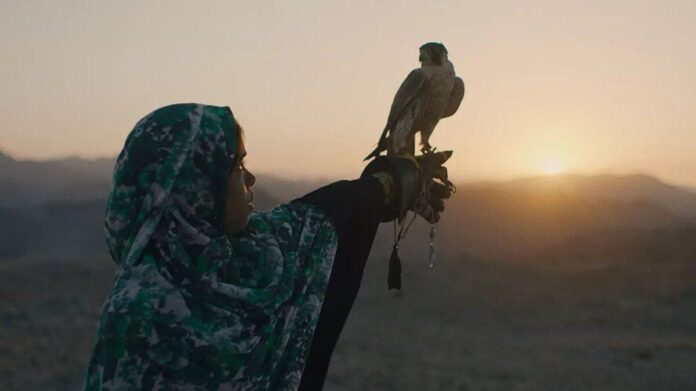Real-life stories carry within them a different kind of charm. Since we are habituated to seeing fictional characters and their world on the screen, fascination is induced when, in that similar medium, we see a story that has actually taken place in the world outside of the cinemas. The ordinariness and inherent simplicity that exist in everyday struggles create poetry without any external effort. There is poetry in the way the world functions; poetry exists in the smallest of things; in little people and their palm-sized existence; in the quest for love and friendship. To continue living is to take part in writing that poem. Hence, to see such a poem created out of sheer living is incredibly charming. Knowing the fact that it is a poem that is not sung by a person, that its poetic elements come not from the conscious working of a mind but from the constant strife of little people who live in each corner, fills up the heart with a love of another kind. “The Falconer” is a similar story that primarily works because of the fact that it is based on one such unusual real incident centered around two friends living in Oman.
Set in a beautiful countryside landscape, “The Falconer” tells the story of Tariq and Cai, who are zookeepers. Coming from different cultural and economic backgrounds, they share a deep bond of friendship. There is a striking scene in the very beginning of the film, where the two are questioned about what they want to become. Cai, having the resources and support, is confident that he wants to study animal conservation as he loves animals. Tariq remains silent when he is passed the baton. Behind his silence, there is a story that is filled with economic struggles, as his father is a beekeeper and has a meager income. He didn’t have the means to fulfill his dreams. The film asks such questions in various instances where the social and financial challenges of both the friends are made apparent. A sudden need for money arises when Tariq’s sister wants to come out of an abusive marriage, and the husband has to be paid back a certain amount given at the time of the wedding. It causes a lot of distress to Tariq, who then tells Cai about it, and the two come up with a plan to steal animals from the zoo and sell them in the black market. Cai is apprehensive in the beginning, owing to his moral values and love for animals. He feels the animals will be mistreated once sold. Again, a conversation ensues between the two, which reflects how they both come from different worlds, ultimately causing more trouble as the story progresses.
“The Falconer” gets its name from a falcon that is stolen by Cai from the zoo, and he wants to train it. Trained falcons are sold for a huge amount. The falcon then becomes the point of interest for Tariq, who is fed up with selling off small animals and getting negligible amounts in return. Through all of this, the film tries to tell a tale of friendship and how two people coming from different cultures come together to become each other’s support. However, all of those points don’t quite translate very well on the screen, and there seems to be a missing link. The film, which starts off with a promise, succumbs later to its own structure. The visuals by cinematographer Nicholas Bupp are staggering and bring out the beauty of the countryside in an extraordinary manner. But all of those pretty sights don’t seem to go anywhere. The images please your senses but don’t stir your heart, and a lot of times, it feels like they are constructed to not bring out the story in a better way but just to make it look beautiful to the eye. Ultimately, it adds nothing significant to the overall restrained storytelling.
There are too many links that the film tries to resolve but doesn’t quite manage to. The story of Tariq’s sister and her abusive marriage comes up in between the narrative. Somehow, it doesn’t feel seamless. The storytelling appears forced at times, leaving the structure naked so that it is very apparent what is going to happen next. The sister’s story feels like nothing more than a catalyst that drives Tariq to do what he does, thereby complicating the situation between him and Cai. It never adds on, and neither becomes an independent thread. The lying metaphor of the bird and how it is taught to fly is also not capitalized well. The poetry in the real story upon which it is based is lost in the way it is told in fiction. “The Falconer” has some interesting moments which demand that the poetry be established, but they are never identified and followed by the filmmakers. Perhaps it needed a different overall approach in order to bring out its poetic innocence to its full capacity. One wishes the real Tariq and Cai had been discovered before, by some filmmaker, and their entire adventure was captured in the rawest possible manner. Then perhaps, it won’t cease to be the poem it could have been.
“The Falconer” is a 2022 drama film based on real life events.

